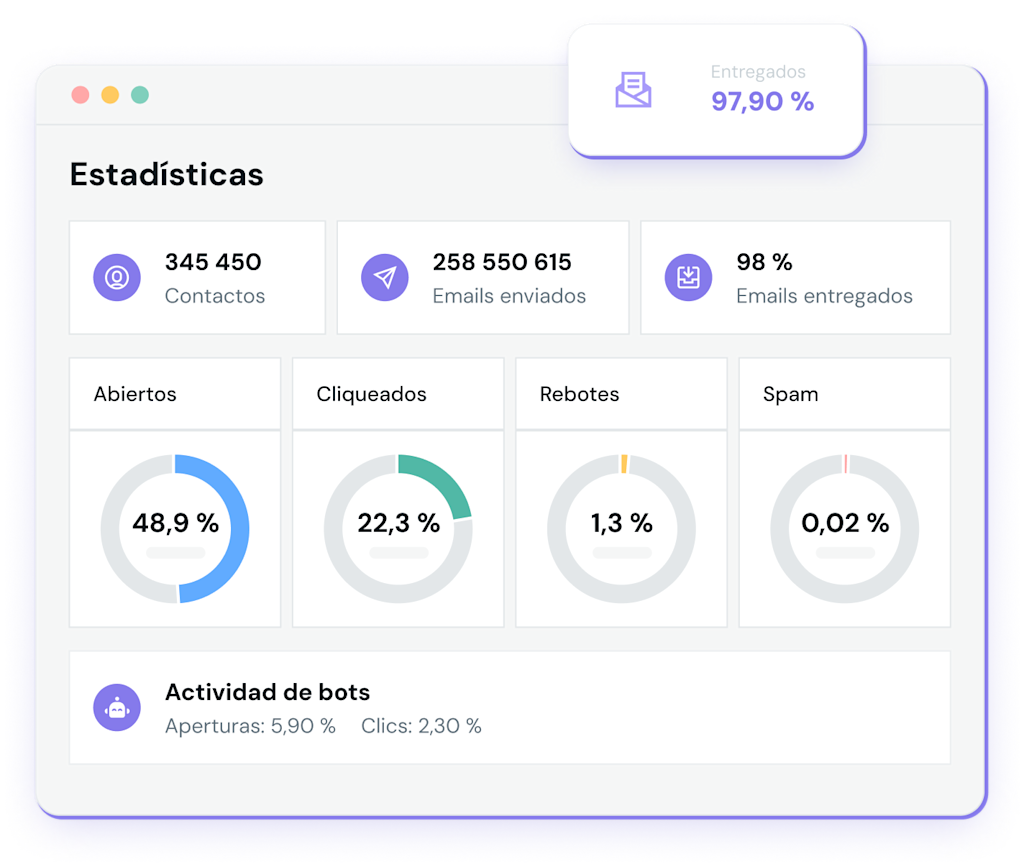El mejor software de emailing para PYMEs
Sabemos lo difícil que puede ser encontrar un software de email marketing para pequeñas y medianas empresas asequible y eficaz. Mailjet es la solución perfecta para tus necesidades. Nuestras funciones avanzadas te ayudan a hacer crecer tu negocio a un precio muy competitivo.
Crea emails impactantes en cuestión de minutos
Crea fácilmente emails atractivos y responsive que se vean bien en todos los dispositivos.
Navega por nuestra amplia Galería de plantillas de emails (con más de 50 diseños).
Pídele a nuestro Generador de plantillas con IA que te proporcione el diseño, el texto y las líneas de asunto de tu campaña.
Utiliza nuestro intuitivo Editor de arrastrar y soltar y aplica fácilmente el estilo de tu marca para hacerla tuya.


RECOPILACIÓN DE DATOS EN CONFORMIDAD CON EL RGPD
Haz que tu lista crezca por sí sola
Utiliza nuestro widget de suscripción para atraer automáticamente a nuevos destinatarios y ampliar tus listas de contacto. Crea fácilmente formularios funcionales y atractivos sin necesidad de tener conocimientos técnicos o de diseño, e intégralos en tu página web.
TEST A/B CON HASTA 10 VARIABLES
Prueba y descubre lo que mejor funciona para tu audiencia
Pruebe hasta 10 versiones de una campaña de email con nuestra herramienta de tests A/B y descubre qué tipo de contenido o diseño genera una mayor interacción entre tus destinatarios.


DIRIGETE A TUS SUSCRIPTORES INDIVIDUALMENTE
Añade un toque personal a tus emails
Personaliza fácilmente tus plantillas de email para mostrar a tus clientes lo especiales que son y generar una mayor confianza. Añade elementos personales como el nombre, la ciudad o la empresa, y personaliza las imágenes con sólo unos pocos clics.
AMPLIO SEGUIMIENTO DE LOS ENVÍOS
Analiza los resultados y haz crecer tu negocio
Descubre cómo cada destinatario interactúa con tus emails y obtén una visión completa del rendimiento de tus campañas para poder mejorar tu estrategia. Con nuestro software de email marketing para PYMES tienes a tu alcance todas las estadísticas necesarias, incluyendo entregabilidad, tasa de apertura y clics, tasas de rebote, cancelación de suscripciones y mucho más, siempre a la vista.


